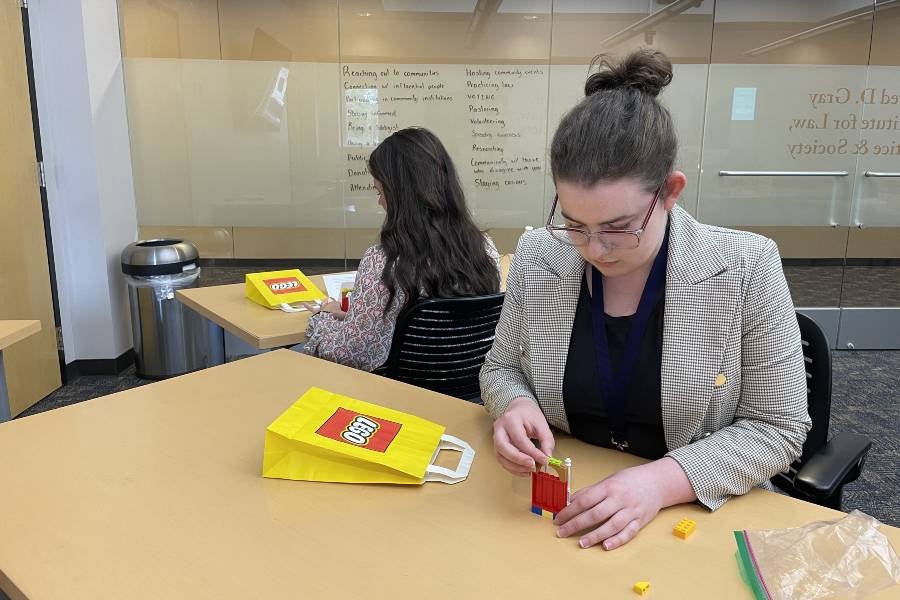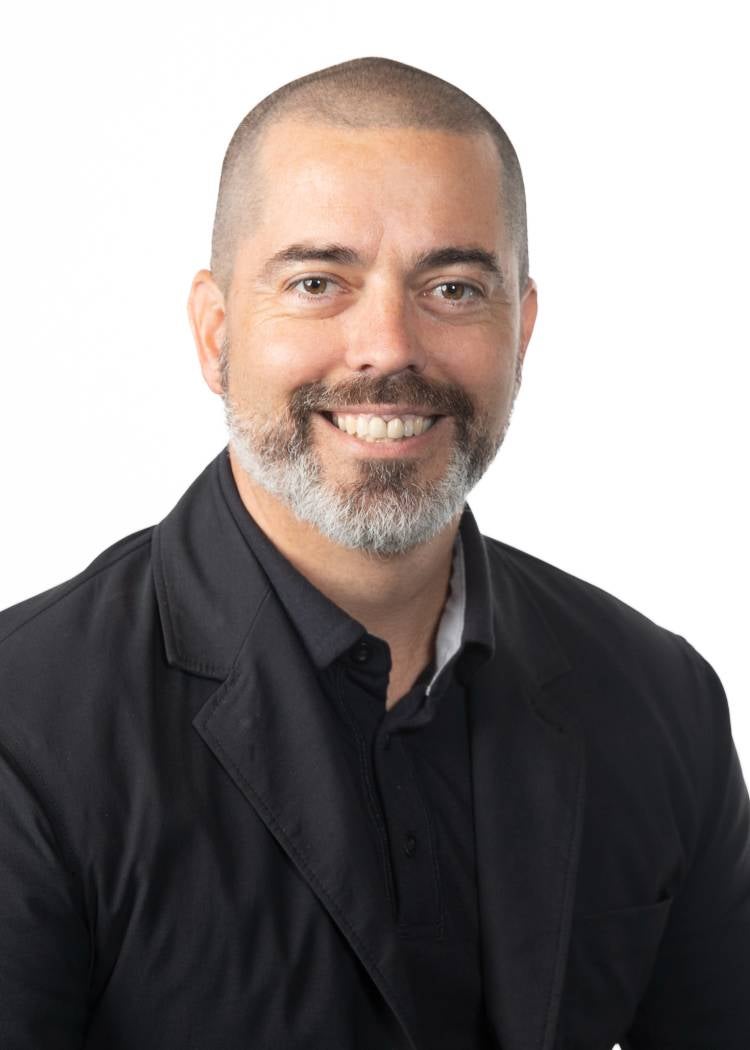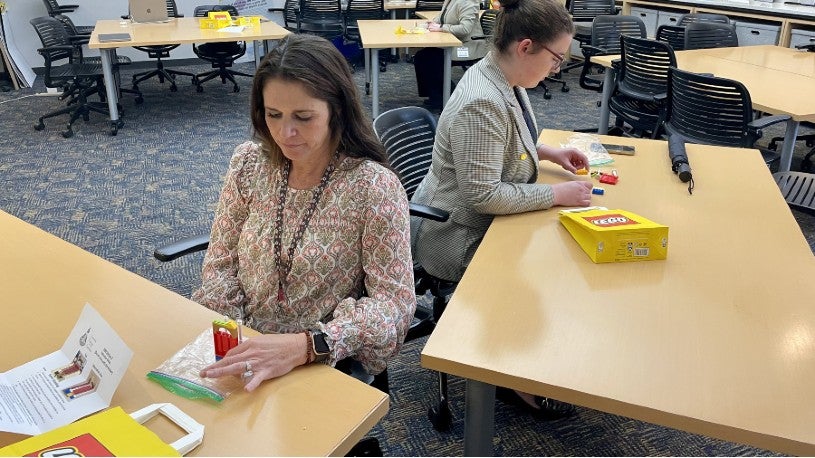CLPS grad students participate in NASA-connected research on communication and resilience
Office of Public Relations & Communications |

In a class that combined leadership, Lego bricks and lunar mission readiness, graduate students in Lipscomb University’s College of Leadership & Public Service (CLPS) recently found themselves playing an unexpected but vital role in research tied to the future of space exploration.

Jeff Thompson
Students participated in the AWE Project: Advancing Wellness in (Space) Exploration, a research initiative led by Jeff Thompson, an adjunct professor at Lipscomb for the past eight years. The project is part of Thompson’s narrative psychology research at both Edinburgh Napier University and Lipscomb University.
Graduate students Abby Bell, Alec Bailey, Lily Corley and Rebecca Johns participated in the project. Their involvement wasn’t just theoretical — it was hands-on and literally brick-by-brick. In a structured classroom exercise, students were paired up for a Lego-building “competition” designed to test and strengthen closed-loop communication skills. Each pair consisted of an “instructor” who gave verbal directions and a “builder” who followed them, but with a catch: they couldn’t see one another or each other’s Lego creations.
“This wasn’t just a fun exercise,” said Thompson. “My work and research in narrative psychology has shown that enhancing personal resilience, leadership skills, and community well-being can be both evidence-based and practical — that is, minimally time-consuming.”
Closed-loop communication, which is the practice of clear messaging with confirmation and feedback, is crucial in high-stress environments such as space travel, emergency response, health care and the military. The simple, controlled nature of the Lego exercise allowed students to experience the complexities of these interactions in a focused, accessible way.
“One of my takeaways from this particular exercise was the value of asking more questions,” shared one student. “Curiosity and good questioning are two of the most powerful communication tools we hold.”
The timing of the class exercise aligned with a real-time, NASA-funded analog astronaut mission happening simultaneously in North Dakota. While Lipscomb students built Lego structures in a Nashville classroom, their analog astronaut counterparts — researchers participating in a simulated space environment — were conducting similar exercises as part of their 14-day mission.
Analog missions are Earth-based simulations designed to mimic the challenges of space travel. They are used to test equipment, research protocols and interpersonal dynamics in isolated, confined and extreme conditions. Thompson’s communication module is part of that research.
“Many of the exercises and activities the analog astronauts are engaging in are the very same ones I have students participate in during my different graduate classes,” said Thompson. “The premise is simple: if it works for NASA and other space missions, we can apply and adapt it into our everyday lives too.”
Read more about Thompson's research: In Awe of NASA: Promoting Resilience in Space and on Earth
Lipscomb students recognized the broader significance of their participation.
“Simple challenges like telling someone how to assemble Legos can easily illustrate communication concepts,” said one student. Another added, “I like knowing that it contributes to important research. I have opportunities like this because of Lipscomb, so I am grateful.”
The AWE Project also aligns closely with Lipscomb’s mission to foster leadership, service, and community impact. “I'm thrilled to have participated,” said another student. “I am proud of Lipscomb and Dr. Thompson’s work.”
Thompson sees the exercise as a form of “re-storying” a moment—viewing it from a new angle to enhance understanding and resilience.
“I often say that the concept of ‘real resilience’ entails developing a certain perspective—one that doesn’t necessarily change what is going on, but instead, approaching it in a different way,” he explained. “In this case, it was Lego. By taking a distinct and purposeful perspective, it moved from being a simple toy, to Lipscomb students contributing to enhancing the well-being and team cohesion for future space missions.”
Steve Joiner, dean of the College of Leadership & Public Service, also supported the project by providing expert guidance to analog astronauts on how to approach conflict and negotiation—skills essential to sustaining team cohesion in isolated environments.
“For more than 25 years, I’ve been exploring how teams operate and how the environments we work in shape our behaviors and relationships,” said Joiner. “What I find most fascinating is how the same person can act completely differently depending on the dynamics of the team or the culture of the group. Understanding those dynamics—especially in high-stakes or confined environments—is crucial to healthy, functional teams.”
“One of the most powerful tools we have is simply asking good questions,” he continued. “When we approach others with curiosity, listen with empathy, and assume that working together is possible—even in challenging moments—we create space for real connection, problem-solving and progress. That’s the kind of mindset we’re encouraging students to adopt in this work.”
That blend of interpersonal insight and emotional awareness is at the heart of Thompson’s research.
“This AWE Project has demonstrated that experiencing awe can certainly occur in profound moments, such as space missions,” Thompson added, “yet it can also be experienced in ordinary moments, including with Lego. Awe can serve as a gateway to many other resilience practices with the result benefiting the individual and extending well beyond them.”
For Lipscomb’s graduate students, this hands-on classroom activity demonstrated that small, purposeful experiences can yield big insights—whether navigating a tense conversation in the workplace or supporting the future of human spaceflight.
